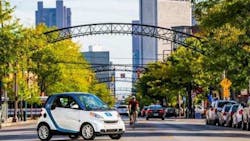And the Smart City of the Future Is ... Columbus, Ohio
Columbus, Ohio, is the winner of the federal Smart City Challenge and will receive up to $40 million to construct its vision for the future of transportation, the White House announced today.
Seventy-eight cities competed for the title, part of the Obama administration’s efforts to envision what a city fully integrated with mobility innovations including self-driving cars, smart traffic lights and vehicle-to-vehicle communications could look like.
The goals are lofty: Mayors of mid-sized cities were encouraged to come up with transportation-oriented solutions to help “close the gap between rich and poor; capturing the needs of both old and young; and through smart design, bridging the digital divide so that the future of transportation meets the needs of all city residents, not just those who are technology savvy.”
Along with Columbus, finalists were Austin, Texas; Denver; Kansas City, Mo.; Pittsburgh; Portland, Ore., and San Francisco. Ideas included self-driving shuttles to cut commutes from underserved neighborhoods and smart sensors to speed up freight delivery.
The challenge is bigger than just the winning city: it’s designed to get cities thinking about the future and funding their innovations. To that end, industry and non-profit partners have pledged more than $500 million in resources, technology solutions and support for projects from all over.
The Department of Transportation has provided technical assistance to all 78 cities to help them identify and apply for approximately $6 billion in federal funding for their projects. Interested cities should go here to learn more about resources available to help implement their Smart City plans.
In Columbus, industry and philanthropic partners have already raised $100 million in non-federal resources to carry out its Smart City plan. See the Columbus mayor's winning pitch.
Key to Columbus’ plan is a new central connected traffic signal and integrated transportation data system to address transportation challenges in four districts. The city plans to use the collected data to improve public transit connections, make transit stations safer, and increase transportation options for at-risk mothers who need prenatal care (Columbus has an infant mortality rate at four times the national average).
In an effort to improve residents’ job options and encourage economic growth, Columbus’ proposal would set up a fleet of electric, self-driving shuttles on three fixed routes between a new bus rapid transit center and a retail district.
It would outfit city fleet, transit vehicles and intersections with connected vehicle technology to optimize traffic flow and communicate parking availability. The plan also calls for investments in electric vehicle charging stations and an electric vehicle cooperative buying program.
Highlights of the other finalists include:
Austin: The nation’s fastest-growing city has proposed increased “park and ride options” including car sharing, bike sharing and autonomous vehicles near hospitals, colleges, housing developments and the airport.
Denver: A freight transportation hub, Denver is partnering with freight companies to equip trucks with V2V communication technology to optimize traffic flow.
Kansas City: Kansas City proposed to revitalize a historically underserved community by installing public Wi-Fi along sidewalks and on new electric, connected public buses, including on self-driving shuttles connecting underserved areas with the existing streetcar route.
Pittsburgh: Pittsburgh is proposing to cut in half the time it takes workers from Hazelwood, a historically underserved community, to reach the city’s urban jobs core by partnering with Carnegie Mellon, a pioneer of self-driving technology, to construct a thirty minute loop for autonomous shuttles.
Portland: Portland proposed to launch the nation’s first bulk-buy program for used EVs to put affordable EVs in the hands of low-income drivers in demonstration corridors and promote electric car and bike sharing in low-income communities.
San Francisco: To increase use of innovative carpooling and ridesharing models, San Francisco envisions a system of new carpooling HOV lanes and reserved curbside pickup areas. In addition, San Francisco has proposed using self-driving cars to shuttle passengers for the first and last mile onto public transit.
About the Author
IW Staff
Find contact information for the IndustryWeek staff: Contact IndustryWeek
